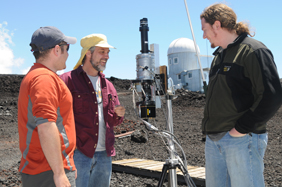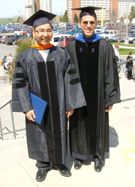Available ECE Research Assistantships



The Electrical and Computer Engineering Department at Montana State University is looking for highly qualified Master’s and Ph.D. students to commence studies in the Fall semester. Candidates for the Master’s program should possess a Bachelor’s degree in Electrical Engineering, Physics or other appropriate field. Candidates for the Doctoral program may enter with either a Bachelor's or Master's degree in an appropriate field. It is our intention to support all qualified graduate students with either RA or TA positions (subject to availability of funding).
Presently, funded opportunities exist for Master’s and Ph.D. candidates with experience or interest in the following specific research areas:
Embedded Systems and Reconfigurable Computing
(Prof. T. Kaiser, Prof. B. LaMeres Prof. R. Snider)
- Real-time Image Processing with FPGAs
- Radiation Tolerant Computing
Optics (Prof. K. Repasky, Prof. J. Shaw)
- Differential absorption LIDAR for lower tropospheric thermodynamic profiling
- Optical remote sensing instrument development and applications, including spectral imaging and LIDAR.
- Atmospheric polarization imaging – design, build, calibrate, and deploy imaging systems to measure skylight polarization for studies of aerosols and clouds.
- Spectral imaging and calibration methods for remote sensing in agriculture, ecology, and environmental science.
Micro and Nanofabrication
(Prof. D. Dickensheets, Prof. A. Kunze, Prof. W. Nakagawa)
- Optical MEMS, miniaturized optical systems and optical instrument design
- Design, fabrication, and characterization of optical nanostructures for interdisciplinary applications
- Micro-/Nano-optical devices for biological, medical, and environmental applications
- Lab-on-a-Chip platforms for mammalian cell cultures
Signals and Controls
(Prof. A. Kunze, Prof. R. Maher, Prof. S. Shaw, Prof. R. Snider)
- Digital Audio Signal Processing / Audio Forensic Analysis: students with demonstrated experience in DSP, signal analysis, and acoustics are particularly encouraged to apply.
- Power system analysis and signal processing
- Computational modeling, statistical machine learning, signal and information processing with applications in computational neuroscience and neuroengineering
- Image and video processing and computational vision algorithms for machine vision applications, imaging systems and intelligent computing
- Neural cell signal processing
For more information about these research topics, please contact the indicated faculty members, or the graduate coordinator, Prof. Wataru Nakagawa.
The priority application deadline is January 15, for all applicants seeking RA or TA support.
Applications from international students received by May 1, or domestic students received by July 1, can also be considered for Fall semester admission (subject to available funding).
